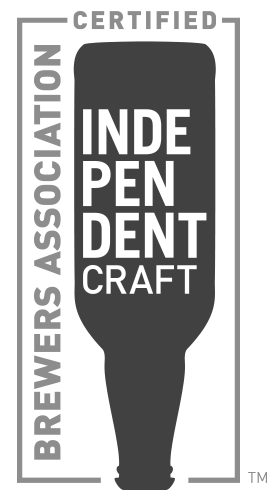Because Anheuser-Busch InBev (BUD -1.14%) continues to dilute the distinction between craft beer and so-called "mass craft," the trade group representing craft brewers has unveiled a new logo that allows consumers to quickly identify if what they're buying is real craft beer...or just "crafty."
While it's true Anheuser-Busch has gone on a multiyear spending spree, scooping up nearly a dozen small, independent brewers as mass-brewed beer sales fell, the real question is whether beer drinkers will care who brews their beer so long as it tastes good. More to the point: Can a new label spur higher craft beer sales again?

Image source: Getty Images.
Craft beer expansion
The craft beer industry is still growing and now accounts for 12% of all beer brewed in the U.S. With over 5,300 breweries operating in the U.S., the Brewers Association says 99% of them are craft breweries: small, independently owned, and producing less than 6 million barrels of beer a year.
Yet that growth has slowed significantly, falling to just 6% last year after many years of double-digit expansion. Of course, the slowdown isn't just because the craft beer market is saturated with new beers; Anheuser-Busch's acquisitions have taken millions of barrels of production out of the market.
In the past two years alone, the megabrewer has siphoned off seven craft brewers, including Elysian Brewing, Golden Road Brewing, Breckenridge Brewing, Four Peaks Brewing, Devil's Backbone Brewing, Karbach Brewing, and most recently, Wicked Weed Brewing.
It's not the only one making acquisitions in the space; Constellation Brands, Molson Coors, and Heinken have all bought brewers to better compete in the $108 billion American beer market. What sets Anheuser-Busch apart from the others is the aggressiveness of its buying habits.
Although big beer and craft brewers have often been at odds -- A-B infamously mocked craft beer in its 2015 Super Bowl ad, calling itself a "macro brewer" -- the pace of acquisitions has many in the industry worried.
Fighting back against encroachment
Jim Koch, founder and chairman of Boston Beer (SAM -1.69%), arguably the biggest brewer most closely associated with the craft beer industry, has twice called on the government to rein in Anheuser-Busch's ability to buy more small brewers. Before that, the Brewers Association itself slammed the giant breweries for trying to pass themselves off as small craft shops.
The trade group has a set definition of what a craft beer is:
- Small: Annual production of 6 million barrels of beer or fewer.
- Independent: Less than 25% of the craft brewery is owned or controlled by mass brewers.
- Traditional: Derives its flavor from the use of traditional or innovative ingredients and their fermentation.
Based on those criteria (and membership in the association), a craft brewer can now display a logo on its bottles and cans that will identify it as a true craft beer. The image is one of an inverted beer bottle -- representing the way "craft brewers have upended beer" -- with the words "Certified Independent Craft." With the new seal, beer drinkers no longer have to wonder where their beer came from -- whether it was from an entrepreneurial brewer or out of the depths of some macro brewer's vast vats.

Image source: Brewers Association.
It's unclear whether the majority of beer drinkers care that much. It might be important to the brewers who take pride in their independence, but for the large numbers of drinkers who are loyal to a beer like Craft Brew Alliance's (BREW) Kona Brewing brand, it likely matters little.
Despite owning such pioneering craft beer brands like Kona, Widmer Brothers, and Redhook, Craft Brew Alliance is not considered a craft beer because Anheuser-Busch owns a 32% stake in the brewery.
What is a craft beer?
It's not surprising, therefore, that Craft Brew CEO Andy Thomas has previously excoriated the Brewers Association for trying to segregate the beer industry. Rather, educating consumers about brewers and their styles, instead of confusing them with labels and questioning their choice of beer, would do more to bring more drinkers around.
He has a point: if beer drinkers like a beer, whether it's A-B's Shock Top or New Belgium's Fat Tire, it's the taste that matters most, and that's what beer drinkers are looking for, at least if a SurveyMonkey survey is to be believed. Perhaps not scientific, but it found that when it comes to choosing a beer, 57% of people make a purchase decision based on a beer's taste; price and style of beer ranked higher than the brewery that produced it, which factored into the decision-making process of slightly more than 40% of the people surveyed.
Certainly, some drinkers will rebel against a brewer selling out, such as reportedly happened when Wicked Weed agreed to be bought out, but by and large someone going to a packaged goods store and picking up their favorite beer probably won't be persuaded not to because it doesn't carry the Brewers Association's stamp of approval.
It's not because Boston Beer isn't a craft beer that it's having trouble selling, but because beer drinkers want their beer new, small-batch, and authentic. Anheuser-Busch InBev is actually tapping into that desire by snapping up these small, craft brewers and introducing their beers to more people unfamiliar with these regional tastes. Until faced with a protracted spate of tumbling sales, Boston Beer eschewed following craft beer trends; now it offers hop-heavy IPAs and nitros, not to mention hard ciders, soda, and water.
Anheuser-Busch InBev's effort should be applauded because it ultimately expands the market for all brewers, even if it also boosts the macro brewer's own sales in the process.




